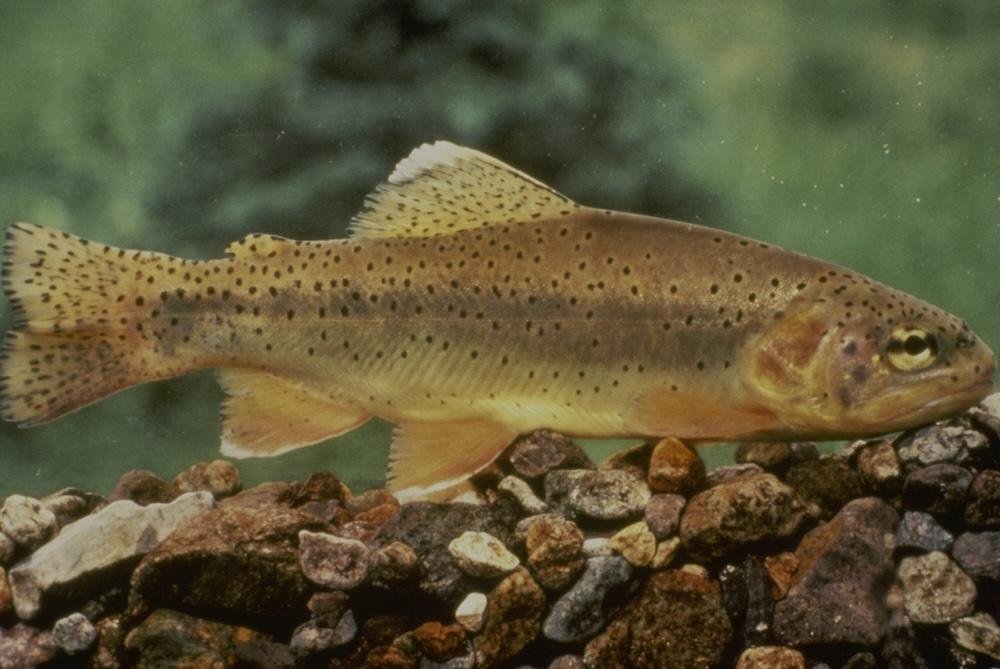arizona
Apache Trout Triumphs: Arizona’s State Fish Emerges from Endangered Species List After 50-Year Revival

U.S. Secretary of the Interior Deb Haaland announced the delisting of Arizona’s state fish, the Apache trout, from the endangered species list on Wednesday. This marks a significant achievement in conservation, reflecting decades of dedication from various stakeholders.
During a gathering in Mesa, Haaland emphasized the success as a result of collaborative conservation, incorporating Indigenous knowledge. “After more than 50 years of devoted efforts among federal, state, tribal and nongovernmental organizations, the incredible recovery of the Apache trout reminds us of the transformational power that collaborative conservation efforts can have,” she stated.
The Apache trout, listed as endangered since 1967, was later downgraded to “threatened” in 1975 as recovery efforts progressed. Governor Katie Hobbs and White Mountain Apache Tribe Chairman Kasey Velesquez joined Haaland for the announcement, underlining the broad support for these efforts.
Native to Arizona, the Apache trout faced challenges primarily due to competition with non-native trout species introduced in the early 1900s. The Arizona Game and Fish Department documented a significant decline, with only a few Apache trout remaining on the White Mountain Apache Reservation by the early 1960s.
In recent years, extensive conservation measures have been implemented, including fencing to exclude livestock and fish barriers to prevent non-native species from encroaching. The state now stocks over 40,000 pounds of Apache trout annually, according to Arizona Game and Fish Commission member James Goughnour. He highlighted the focus on enhancing the fish’s genetics and ensuring their health and sustainability.
This conservation milestone has been supported by a $5.1 million investment in wildlife under President Joe Biden’s administration. However, some experts express concerns regarding the timing of the delisting. Robin Silver, co-founder of the Center for Biological Diversity, argues that the presence of exotic predators and livestock continues to threaten the trout’s habitat, particularly in higher elevation streams affected by climate change.
“This is not an endangered species that has recovered,” Silver contended, predicting the need for future relisting due to ongoing threats. He criticized the U.S. Fish and Wildlife Service for allegedly prioritizing state conservation plans over broader ecological considerations.
Julie Carter, Aquatic Wildlife Branch Chief at the Arizona Game and Fish Department, acknowledged the challenges faced by native species, particularly during drought conditions. “Drought is a big problem for native fish species in Arizona, especially for native trout species,” Carter noted, referring to the increasing temperatures and reduced water flows in higher elevations.
The delisting of the Apache trout symbolizes a collaborative achievement among multiple agencies, including the U.S. Fish and Wildlife Service, U.S. Forest Service, and the White Mountain Apache Tribe, all dedicated to the recovery of this vital species.
Cronkite News reporter Ignacio Ventura contributed to this report.












![Bryan Merritt, 36, was arrested June 26 after allegedly trying to break into his estranged grandfather’s home in Homestead. [PCSO]](https://arizonanews.org/wp-content/uploads/2025/07/Break-In-or-Breakthrough-Man-Arrested-During-Family-Reunion-Gone-Awry-80x80.jpeg)





